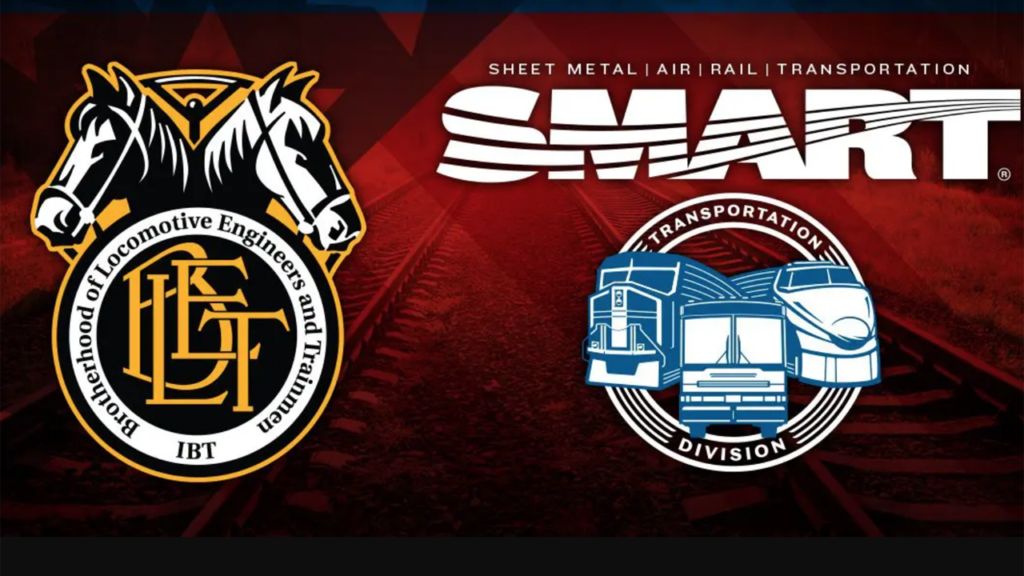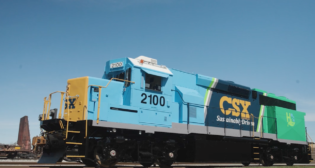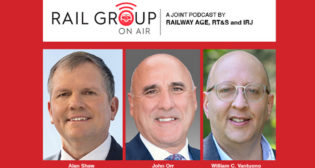
Railroads Prepping for Strike Action: AAR (UPDATED)
Written by Railway Age Staff
“Railroads are taking all measures necessary to handle sensitive cargo in accordance with federal regulations to ensure that no such cargo is left on an unattended or unsecured train in the event of a work stoppage due to an impasse in labor negotiations,” AAR said. TrinityRail photo
The six Class I freight railroads participating in national bargaining will begin taking steps as early as Sept. 12 to manage and secure shipments of hazardous and security-sensitive materials “in light of the possibility of a rail labor strike,” the Association of American Railroads (AAR) said the evening of Sept. 9. The SMART-Transportation Division (TD) and Brotherhood of Locomotive Engineers and Trainmen spoke out on embargoes* on Sept. 11.
AAR reported on Sept. 9 that hazmat such as chlorine used to purify drinking water and chemicals used in fertilizer are among the targeted shipments. “Railroads are taking all measures necessary to handle sensitive cargo in accordance with federal regulations to ensure that no such cargo is left on an unattended or unsecured train in the event of a work stoppage due to an impasse in labor negotiations,” according to AAR. “Additionally, other freight customers may also start to experience delayed or suspended service over the course of next week, as the railroads prepare for the possibility that current labor negotiations do not result in a resolution and are required to safely and securely reduce operations.”
AAR cautioned that “[w]hile these preparatory actions are necessary, they do not mean a work stoppage is certain.” Carrier representatives will continue meeting throughout the weekend of Sept. 10-11 with the unions who have not made tentative agreements—among them, the two largest, SMART-TD and BLET—in the hopes that they will join the ones that have.
BNSF Executive Vice President and Chief Marketing Officer Steve Bobb emphasized this in a Sept. 9 online customer notification: “While these preparations are necessary, it does not mean that a work stoppage is inevitable. BNSF and the other railroads continue to work with the remaining unions to reach voluntary agreements based on the PEB’s [Presidential Emergency Board 250’s Aug. 16] recommendations to avoid interruption to rail service. …”
With the federally mandated cooling-off period ending at 12:00 a.m. ET Sept. 16, Bobb also called on customers “to take action today. Please contact your U.S. Senators and Representative to let them know the impact a rail service interruption would have on your business and your customers. It is critical that Congress hear from freight rail customers as soon as possible. If there is a labor strike on September 16, Congress can intervene to prevent or quickly resolve the service disruption. We would ask that you urge Congress to impose the recommendations of President Biden’s Presidential Emergency Board, which formed the basis for agreements already reached with several of the unions.”
AAR summed up that “[t]he railroads want, and continue to advocate for, a prompt resolution that would provide historic wage increases to rail employees and allow the railroads to continue servicing customers and prevent further disruption to the struggling supply chain.”
Union Pacific echoed that statement in a Sept. 9 online customer notice, saying it is “committed to working with the rail unions to reach a voluntary labor agreement as quickly as possible. It is in the best interest of all parties to resolve the negotiations and prevent service disruptions. …” On Sept. 13, the Class I railroad said in an online notice it “continues to push for a prompt resolution to the labor negotiations. We are working hard to resolve disputes with the remaining unions before the cooling off period ends. … Due to the uncertainty of the labor negotiations, we are prepared to take the proactive steps to secure our customers’ goods. At this time, we have only embargoed rail security-sensitive material (RSSM) shipments to make sure these hazardous commodities are safely secured in the event of a work stoppage. You may reference our Embargo page or the AAR Embargo System for active embargoes.”
Norfolk Southern (NS) wrote in a Sept. 9 service update that customers were being told it “will temporarily halt certain types of shipments beginning September 12. In addition, to safely ramp down our network and enable us to bring service back quickly, certain other customers will see a preliminary curtailment of service before September 16. Should the two remaining unions [SMART-TD and BLET] commit not to strike, we will resume full operations. We have communicated to all parties in the negotiations that we will not lock out union employees. Our goal is to keep our nation’s economy moving, serve our customers, and reach agreements with the remaining unions.” In a Sept. 11 online notification, NS EVP and Chief Marketing Officer Ed Elkins wrote, in part, that “we must begin issuing embargoes for certain types of shipments beginning today, which includes rail security-sensitive material (RSSM) and certain time-sensitive shipments outlined in the embargo. Additionally, customers in certain markets, including bulk unit trains, intermodal, and automotive, will see a curtailment of service up to 72 hours before the end of the cooling-off period to prepare for a safe and orderly stoppage should there be a strike. An embargo with specific information for intermodal and automotive customers is scheduled to be issued on September 11. We will communicate with all affected customers quickly and transparently about their shipments.” As a follow up on Sept. 13, NS said in a online notice it had adjusted its “contingency plans for a controlled shut down of the network at 00:01 EST Friday, September 16. Effective 17:00 local time on Wednesday, September 14, 2022, Norfolk Southern will close all gates to Intermodal traffic.” The railroad provided these general guidelines: “In-gates for loaded or empty intermodal units for rail movement will close at all NS Intermodal terminals; traffic originating at on-dock port facilities and privately owned intermodal terminals will not be accepted; customers with eastbound interline shipments should contact the originating rail carrier regarding guidelines for the acceptance of traffic at origin; and until further notice, out-gates will remain open at all NS Intermodal terminals during normal business hours for customers to pick up units.” Additionally, NS said customers using EMP and TMX containers should note the following: “We will discontinue filling reservations on equipment effective at 00:01 local time Wednesday, September 14; any empty units out-gated after 12:00 (noon) local time Sunday, September 11 and until further notice will be charged according to normal per diem schedules; and customers will be able to return empty EMP and TMX containers to NS terminals as normal until further notice. This process may be modified as terminal conditions require.”
CSX in a Sept. 9 online customer advisory reported that it was “taking steps to ensure the safety of high hazardous, toxic by inhalation and poisonous by inhalation (TIH/PIH), materials in the event of a potential rail labor strike. We remain hopeful that agreements will be reached, but to prepare for the possibility of a work stoppage, the company will take action by issuing an embargo on all TIH/PIH shipments and other safety-sensitive freight effective Monday, Sept. 12. CSX will work to ensure compliance with federal regulations and avoid the potential of safety-sensitive and hazardous materials being left unsecured or unprotected. In addition, we are advising all customers that delays and service suspensions are possible if the impasse in labor negotiations continues.”
BNSF on Sept. 12 wrote in an online customer notification that it would stop the in-gate of temperature controlled intermodal units. It said: “As you are aware, BNSF and the other railroads continue to actively meet with labor unions to seek agreements before the cooling-off period ends this Friday, September 16, 2022. Although we have now reached tentative agreements with nine of our 12 unions, every union has to be under an agreement to avoid a strike or other job action that will impact the movement of your freight.
“With the deadline quickly approaching, BNSF must take action on a small subset of certain commodities before a service interruption to ensure our customers’ freight safety and security, including temperature-sensitive shipments.
- “Effective Wednesday, September 14 at 12:01 am, BNSF will not allow Temperature Controlled Intermodal (TCI) units to in-gate at any of its intermodal facilities.
- “Customers are encouraged to pick up their TCI units that have reached their final destination and units at origin that have not been loaded onto a train.
- “Non-running TCI units used for dry bulk shipments may still be in-gated.
“The situation remains fluid, and BNSF will continue to update you as more information becomes available. We appreciate your patience and ongoing collaborative efforts as we work to reach agreements with the remaining three unions to avoid disruption to rail service. If you have any questions, do not hesitate to contact your marketing representative.”

On Sept. 11, SMART-TD President Jeremy Ferguson and BLET President Dennis Pierce released a joint statement on rail embargoes, which they called a “completely unnecessary attack on rail shippers.” They said they “remain at the bargaining table and have given the rail carriers a proposal that we would be willing to submit to our members for ratification, but it is the rail carriers that refuse to reach an acceptable agreement. In fact, it was abundantly clear from our negotiations over the past few days that the railroads show no intentions of reaching an agreement with our unions, but they cannot legally lock out our members until the end of the cooling-off period. Instead, they are locking out their customers beginning on Monday [Sept. 12] and further harming the supply chain in an effort to provoke congressional action.”
The railroads, they stressed, “should work towards a fair settlement that our members, their employees, would ratify,” and “Congress should stay out of the rail dispute and tell the railroads to do what other business leaders do—sit down and bargain a contract that your employees will accept.”
Railway Age Capitol Hill Contributing Editor Frank Wilner, on Sept. 13, told Railway Age: “The Transportation Division of the Association of Sheet Metal, Air, Rail and Transportation Workers (SMART-TD) on Sept. 12 sent to families of its more than 37,000 rail members a form letter for them to resend to their congressional representatives asking lawmakers not to interfere if a work stoppage occurs. A sudden flood of form letters to Congress, each identically worded, is known as lobbyist-coordinated Astroturf as opposed to grassroots efforts where individuals act independently with original—and often handwritten—letters.” (Wilner is author of “Understanding the Railway Labor Act” as well as a former director of public relations for SMART-TD and its United Transportation Union predecessor, an assistant vice president for policy at the Association of American Railroads, and a White House (Bill Clinton) appointed chief of staff at the Surface Transportation Board.)
On Sept. 13, SMART-TD sent a rail negotiations update letter to leaders in Congress (scroll down to view). The letter noted that the union continues “to perceive a voluntary agreement between the two parties [SMART-TD and the National Carriers’ Conference Committee (NCCC), which represents most major railroads (and many smaller ones) in national collective bargaining] as the best option for our members and the nation. … According to internal polling … we have performed throughout the negotiations process, if a tentative agreement limited to the parameters of the PEB were presented to the membership for ratification, the effort would fair at more than three-to-one. … Therefore, it is imperative that negotiations between labor and the carriers be permitted to play out.” The letter concluded with SMART-TD asking Congressional leadership “to please let the two sides work this out. If intervention does become inevitable, then please hear our request and consider our proposal for the sake of our members’ families.”
Frank Wilner noted in a Sept. 11 labor update commentary that the “wicket that neither negotiators nor Congress may be unable to unstick encompass work rules affecting SMART-TD and the BLET—a MERSA-like festering wound of carrier crammed-down attendance availability policies and unpredictable work-rest cycles that train and engine service employees insist are destructive of family values and worker mental and physical health.” In a National Mediation Board-guided bargaining session last week, following release of the PEB recommendations, Wilner reported, “SMART-TD and BLET held firm in demands beyond what the PEB recommended and regurgitated demands the PEB had rejected. Carriers, meanwhile, declined to compromise and held firm that they will accept nothing other than the PEB recommendations.”
* An embargo, explains Railway Age Capitol Hill Contributing Editor Frank N. Wilner, “suspends a shipper’s right to common carriage by restricting freight movements. Embargoes are issued by a railroad when weather, congestion, labor strife, natural disasters, or track conditions prevent fluid operations. Federal courts have held that an embargo may not be used as an alternative to seeking regulatory approval for line abandonments, to avoid handling unprofitable or undesired traffic, or to influence routing. Shippers may ask rail regulators to cancel an embargo.”



